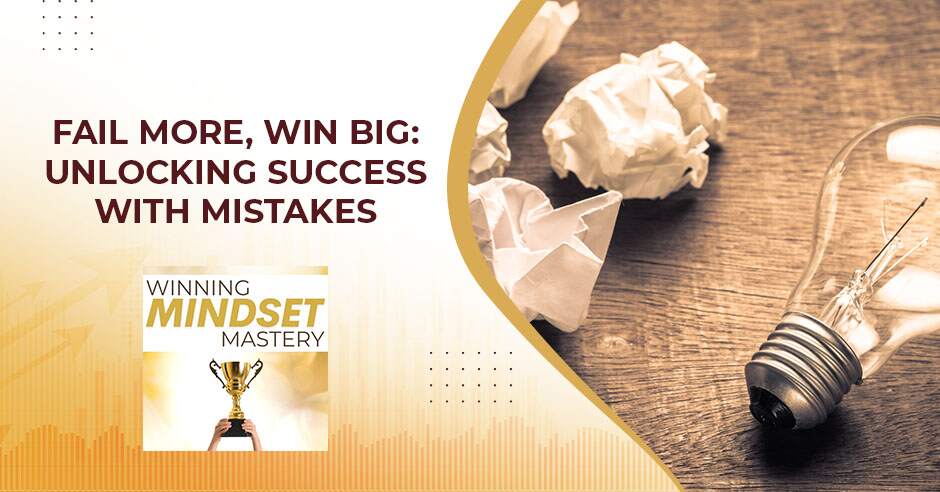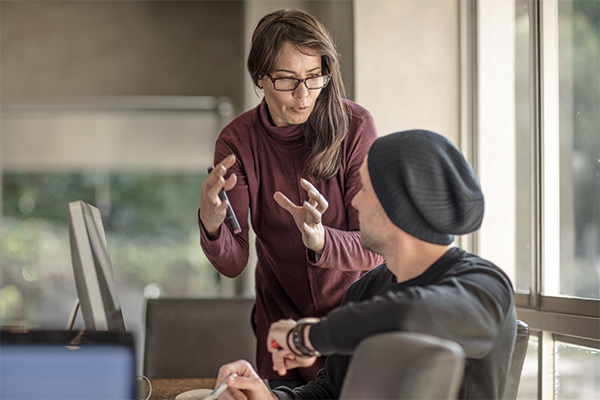 In this episode, April unveils the hidden power of embracing failure as a catalyst for growth. With a tale of her own misstep during a workshop, she reveals how an ineffectively leading a mindset exercise made for a much better training. April unravels the priceless lesson that lurks within the shadows of failure. By owning shortcomings, we not only sharpen our abilities, but also often demonstrated the very behavior we are trying to model. Learn how our failures are, in fact, invaluable teachable moments and how to harness the hidden potential within in all of us to speed up our success.
In this episode, April unveils the hidden power of embracing failure as a catalyst for growth. With a tale of her own misstep during a workshop, she reveals how an ineffectively leading a mindset exercise made for a much better training. April unravels the priceless lesson that lurks within the shadows of failure. By owning shortcomings, we not only sharpen our abilities, but also often demonstrated the very behavior we are trying to model. Learn how our failures are, in fact, invaluable teachable moments and how to harness the hidden potential within in all of us to speed up our success.
—
Listen to the podcast here
Fail More, Win Big: Unlocking Success With Mistakes
Thank you for joining me. We talk about reframing things all the time because they can help you feel better about a situation, help you better see the opportunities and make you more empowered in any situation. However, did you know that reframing can make failures valuable? You don’t believe me. I’ll use myself as an example.
A colleague asked me to help teach a two-day leadership workshop for trainers who were instructors of canoe and paddleboarding, who taught other instructors how to teach people to do it. These are instructor trainers of instructors. We are helping them with modeling how to be good leaders because that’s what they’re teaching these other instructors to do. In addition to that leadership and modeling instruction, I want to talk about mindset and how powerful that is with everyone. I used an experiential exercise that is super powerful.
I’ve done it many times and it helps people understand how mindset and how you view things in your mind over and over again can impact your physical reality. It’s a fun exercise. It only takes a couple of minutes and when done well, it opens people’s minds to talking about mindset and how powerful that can be about what they’re trying to do. Notice I said when it’s done well because I didn’t do it well in that particular situation.

Your mindset and how you view things in your mind over and over again can impact your physical reality.
I did notice that there seemed to be several people who were a little like, “I’m not sure I got it,” but they were such professionals and leaders that they went right into the work workshop. I thought about it for a moment but then focused on them and what we were doing. When we broke for lunch, the gentleman who had brought us in for the workshop said, “April, I’d love to give you some feedback on that mindset exercise.”
I love feedback. It is the gift that keeps on giving. I said, “Absolutely. What do you think?” He told me. He said, “One of the things I noticed is I’m familiar with that exercise. I’ve done it before. You did it so quickly that some of the instructors couldn’t follow you so they didn’t get the a-ha moment and the results that you were going for. You then went ahead and started the workshop.”
I’ve got to tell you, I’ve got heat crawling up the back of my neck and I’m slightly mortified because I’m a mindset expert. I do this all the time. It was me taking for granted that I had done it so many times and doing it super quickly because I knew where it was going was 100% my fault that they didn’t get it. At that moment, as soon as I got over being mortified by that embarrassment, I was so grateful because it made me very empathetic about the exact thing that we were challenging them to do, which takes feedback from the instructors that you’re training.
If they say they don’t get something, there might be a different way to explain it or another way you could do things that would resonate with more people. I realized in getting that feedback, that’s tough to do. I know that’s the right thing to do but experiencing it right at that moment and failing in that big way while I’m there to teach and help was wonderful because I knew immediately.

If people say they don’t get something, there might be a different way to explain it or another way you could do things that would resonate with more people.
I told him, “I’ve got to talk to them after lunch about my failure.” Someone explained to me that there was a better way to do it. I could’ve done it better. This is what their experience would’ve been like if I had. I shared that with them, be vulnerable and model to them what it is that we’re asking them to do with their instructors. I got back after lunch and did exactly that.
Here’s what’s crazy. Sharing that failure went over far better than that exercise that had gone over well with thousands of people in a room. Why? It’s because taking the moment to share my failure made it okay for them to fail. It made it okay for them to go in front of the students that they were teaching those other instructors and say, “Someone pointed out how I could have shared this with you in a way that would’ve resonated with more people.”

Taking the moment to share your failure makes people realize it’s okay for them to fail.
What’s powerful about that is it was more beneficial to have failed than it would’ve been if I hadn’t. Part of that’s a reframe. Part of that is true. We all learn more when we fail than we do when we win. What if we looked at every time we failed as not only a great teachable moment for us but a potential teachable moment for everyone else? I’ll save you the mistake. I’m the one who fell on my face. Here’s what happened. I’ll share it with you.
We all learn more when we fail than we do when we win. Share on XIt’s because of this that I do feel like Fridays. Every Friday across all my social media, I share something that I did terribly at and the lesson I learned hoping that, 1) People will see that no one gets it right all the time and, 2) I might save 1 person or 2 people from making my silly mistakes. If you have a failure that you’d like me to reframe or you want to share how you were able to see that as something beneficial to you or others, reach out to me. Go to the Ask April section. That’s where you and I can talk personally and privately. Go ahead and send me a message and let me know. Here’s to your success.





